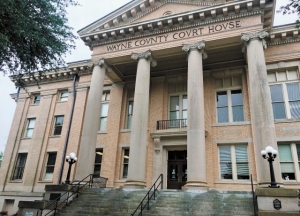Initiative focuses on minor offenses
By Ethan Smith
Published in News on June 23, 2017 7:13 AM
A child throws a book at another student.
Or maybe he or she verbally threatened someone.
And now that student is standing in front of a judge in adult court facing criminal charges.
District Court Judge Ericka James got tired of seeing these types of minor offenses come into her courtroom.
So she decided to do something about it.
"I shouldn't have 16-year-olds in here for stealing somebody's cellphone at school," James said. "Especially when they recover the cellphone and the next day the kids are friends again."
James is heading up a local effort, partnering with community stakeholders, to develop a memorandum of understanding for a misdemeanor diversion program.
This local effort is separate from a state legislature initiative to pass a bill that would allow for 16- and 17-year-olds to be treated as juveniles within the criminal justice system, instead of adults.
James said the local initiative would go forward regardless of whether the bill at the state level passes. It would be limited to misdemeanors.
While it is still in its planning stages, the thrust of the program is to keep minor offenses that happen at school, and which could be handled internally, from turning into a criminal charge and coming into the courtroom.
James said officers and deputies in schools would make the first call about whether or not to charge a student with a criminal offense.
She acknowledged this could be interpreted as asking authorities to not enforce the law, but said it empowers officers to make the decisions on a case-by-case basis.
"Law enforcement makes those decisions every day," James said. "It's no different from when they catch you speeding and they issue you a warning ticket instead of actually citing you."
This local effort, too, is a proactive measure that affords children more chances to correct their behavior than Teen Court would.
Wayne County Teen Court provides teenagers charged with crimes the chance to be mock-tried in front of their peers, but it is a one-shot deal.
If the teen reoffends after successfully completing Teen Court, there are no more second chances and the new case goes to adult court to be prosecuted by the District Attorney's office.
"For a relatively minor offense, we don't want them to be saddled with that burden for quite some time to come," James said.
The collective body of community stakeholders -- which includes law enforcement and school board members -- will get to decide which offenses are included in the local misdemeanor diversion program and which ones are not.
The program does not yet have an official name.
Wayne County Sheriff Larry Pierce said he could not comment too much on the program while it was still in its infancy, before anything was firmed up about which charges would be included in the program.
He said he had attended several meetings about the program.
"We're still reviewing all the aspects of this program, so until it's actually firmed up and is actually what we're looking at, there's not a whole lot of comment I can make because I don't know exactly what crimes we'll be looking at," Pierce said. "Our SROs are not put in schools, of course, to discipline children -- they're put in schools and they have to enforce the law."
Goldsboro Police Chief Mike West did not return a phone call seeking comment about the program.

